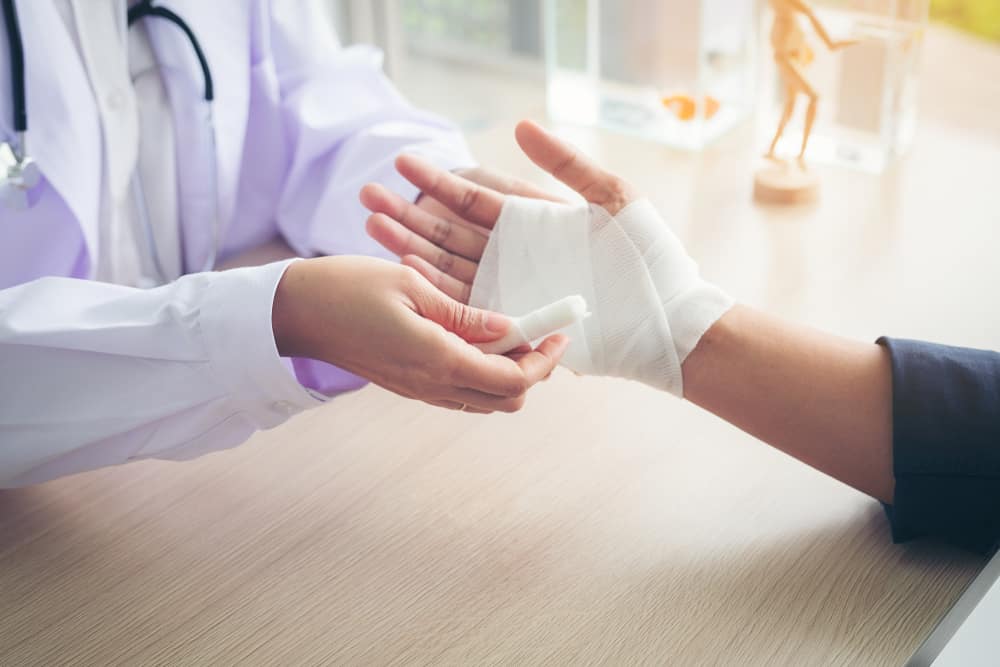We use our hands to do so much throughout our day and can tend to take them for granted until we experience an injury to one or both hands. In the case of a car crash, you may find yourself at the doctor’s office learning about how your hand injury may impact your daily life. Unfortunately, even the smallest rear-end collision or fender-bender can cause an injury, so you want to seek out quality care from a hand surgeon to discuss all your options for treating a hand injury.
There are signs to look out for when you are wondering whether or not to seek medical treatment for a hand injury. While in some cases the pain and injury is obvious enough that you seek medical attention right away, other types of injuries may cause initial pain and discomfort that you expect to go away with time. However, if you experience swelling, bruising, numbness, or the inability to move your fingers and joints like normal, then you need to see a doctor.
Fractures
Fractures are more commonly referred to as broken bones. When you break a bone in your hand, you will be unable to complete your daily tasks like normal and will likely be experiencing pretty significant pain. Because your hands are so delicate, any car accident injury can cause impairment. A hand fracture could refer to a broken bone in your finger or the bones in your palm. In serious car crash cases, one or both hands may be crushed in the accident.
Symptoms of a hand fracture will likely be very prominent and unavoidable, including extreme pain in moving your hand or trying to move your fingers or form a fist. Swelling, bruising, and tenderness in the area is a sign that an injury has occurred, while these symptoms plus an obviously crooked finger or other deformity signals a fracture. It is important to seek medical treatment for any type of hand fracture to ensure the bones in your hand heal properly.
Torn Ligaments
One type of torn ligament in your hand is a hand sprain, which occurs when the ligaments connecting bones in your hands are stretched out of their normal range of motion or even torn. Injuries to ligaments can cause problems when left untreated can cause your injured hand to not heal properly. When a hand injury does not heal properly, you risk chronic pain and discomfort when using that hand.
Ligaments stabilize the joints in your hand and you may notice a torn ligament hand injury when it occurs around one of your knuckles. Knuckles are joints in the hand that can be commonly injured in the case of an accident when the ligaments that support and stabilize the knuckles are torn. Signs of a torn ligament around the knuckles can include pain and swelling and you may also notice bruising in the area.
Joint Dislocations
In addition to torn ligaments around your knuckles, your knuckles themselves can become dislocated in a car crash when you naturally use your hands to brace yourself or they are otherwise harmed in the force of the accident. The most common dislocation in the hand is with the middle knuckle of each of your fingers. The joints in your hand are what allow for movement and when a joint is damaged you will likely experience a decrease in your general range of motion. When left untreated, a dislocated joint in your hand can result in permanent damage that can affect common daily tasks.
When a joint in your hand is dislocated, you will likely experience swelling, redness, numbness, and difficulty moving the finger in addition to the pain. In the event of an injury to a joint in your hand, it is important to remember to remove any rings as soon as possible. Once the fingers begin to swell, it can prove quite difficult to remove the rings and can even cut off circulation in extreme circumstances.
Diagnosing Hand Injuries
A hand surgeon will use a variety of state-of-the-art diagnostic imaging technologies to help with the diagnosis and to also receive a more in-depth visual of what is going on inside your hand. When it comes to diagnosing a hand fracture, your doctor will likely take X-rays of the hand for a more detailed look at the injury because X-rays offer detailed images of bones. An MRI scan or CT scan may be recommended when your doctor suspects a torn ligament or issue with soft tissues, as these types of diagnostic tools provide a picture of not only bones but also muscles, ligaments, and tendons.
AICA Orthopedics provides comprehensive care for all victims of car accident injuries and has a team of multi-specialty doctors to treat everyone. If you have been in a car crash and experienced an injury to your hand, schedule an appointment to learn more with one of our expert hand surgeons at AICA Orthopedics.





